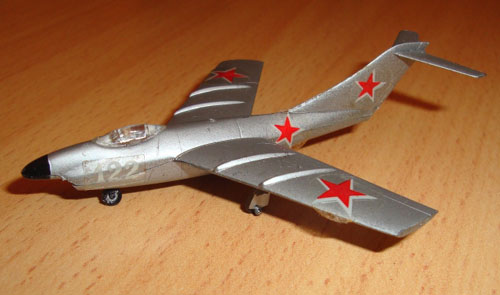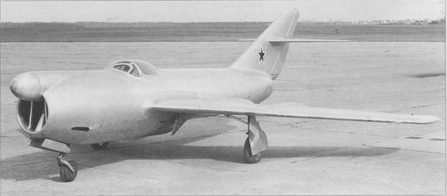Modeling Now and Then
|
 |
Introducing My Guest Columnist
The biggest philosophical difference in my modeling Now and Then is
this: Then, I modeled alone; Now, I have modeling friends-and-relations
everywhere. Then, I couldn’t find another airplane modeler within
bicycling range; Now, it was a cinch to find one in France! (I live near
Seattle, Washington in the U.S.A.) He won the bid in a recent eBay auction
for a Lindberg “MiG-19” kit, just as bizarre as the model
I wrote the prior column on: Aurora ‘Famous Fighters’ Russian
Jet! I sent him an email message asking for a few pictures of the kit
box and contents, and one thing lead to another. It seems his interest
in—and knowledge of—the odd kits of the time greatly exceed
my own. He’s writing a book about it all, and for now, offered to
share some material with us. I ‘tweaked’ (Americanized?) his
words and phrases just a bit, but it’s his writing, and he did it
in English. (My own French is confined to general aviation terms we adopted,
like ‘aileron’ and ‘empennage’.) So here’s
Jean-François, with the facts about the:
Imaginary MIG-19s of the 50s
Where a phantasm produced two types of imaginary planes
By Jean-François Fulconis
Following the introduction of the MiG-15 in the Korean War, Western
specialists were waiting, with a certain apprehension and a real curiosity,
the release of its successor. Within this context, several journalists
working in aircraft publications in the US or in England had the temptation
to try to imagine what could be the successor of the famous MiG-15 that
was, without any doubt, a bad surprise for the common idea of the “Western
technical superiority”.
Therefore, from 1951 on, articles appeared with a picture showing a
new Soviet aircraft named “MiG-19” that, following some “reliable
sources”, corresponded to the next generation of fighters that the
Soviets would deploy very soon.
And what is quite impressive is that this exercise of imagination has
produced many derivatives or variants of “MiG-19s” during
the 50s, until the real MiG-19 became well known.
Indeed, it is possible to find not only articles in newspapers, magazines
or encyclopedias, but also several models kits in various scales, some
toys, and a collector’s card!
And all represent a “MiG-19” that existed only in the imagination
of their creator.
The “MiG-19” type Ta-183
The Focke-Wulf Ta-183 was a swept wing fighter, designed near the end
of the Second World War by German engineers, that was very close to its
first flight when the Focke-Wulf factory was captured by the Western allies.
The Soviets also recovered some material about this aircraft and proceeded
to do some wind tunnel tests to validate the mathematics of the swept
wing. The result of these tests helped the design of the MiG-15, but according
to the MiG OKB, the concept of the Ta-183 itself had no direct impact
on this design, though there is a similarity in the general shape.

Box art of the model kit Ta-183 from PM Model in 1/72 scale
(Photo of a model kit of my personal collection)
When the first “MiG-19” picture was published in 1951 by
Aviation Age Magazine, it was obviously based on the Ta-183, especially
on very characteristic tail, which is very long, thin and with a horizontal
stabilizer on the top.

Picture of a MiG-19 published in the US by Aviation Age Magazine in 1951
The caption of the picture was “The latest product of Russia’s
aircraft designers, a very fast interceptor-fighter designated the MiG-19”
(Photo from my personal collection of a newspaper extract that I bought
in eBay US)
Following the evolution of fighters at this time, the MiG-19 / Ta-183
was quickly “updated” with a nose fitted with radar, like
the F-86D Sabre in the US. Often the aircraft was presented having only
one engine, but there are also some publications showing it with two jet
engines, or with one jet and one rocket engine.
Aurora’s model kits
The concept with the radar nose would produce a famous model kit from
Aurora in 1/48th scale, which was first released as the “Yak 25”
(another mythical Soviet aircraft) in June 1953 before it became the “MiG-19”
with some additions (landing gear and some rockets) in 1954. What is interesting
is that this model kit would be sold “as is” (with several
types of boxes) until 1970!
The “MiG-19” type Air Trail
Air Trail was a magazine for aircraft enthusiasts and modelers very
popular in the US during the 50s. It published its own vision of the “MiG-19”
in June 1953 (the same month of the release of the Aurora Yak-25!) via
an article with the title “Inside Story of MiG-19”.
This article presented an aircraft with a similar general shape of the
Aurora model but with a completely different tail, and with two engines
instead of only one. This aircraft appeared more realistic than the type
Ta-183, with an airframe closer to the aspect of a Soviet fighter.
What is interesting is how the jet was presented, because from our view
of 2008, we can feel that journalist at this time were very “imaginative”
and unscrupulous to publish false information…
Extract of the text:
“The “Super-MiG”-19 is a beautiful fighter which was
first seen publicly at the last Summer Aviation Day’s display at
Thushino Airport and made its combat debut over Korea last October”.
This affirmation is especially “nice” when it is compared
with the true saying that the real MiG-19 made its first flight in January
1954 (as prototype SM-9/1) and that it entered service in March 1955 (as
the ‘Farmer A’ model)!



From top to bottom, pictures of the “MiG-19” presented by
Air Trail in 1953
(Photo of my personal collection extracted from the magazine Air Trail
from June 1953 that I bought in the USA)
Lindberg’s model kit
Lindberg produced its own version of the “MiG-19” in 1954.
It seems that it was based partly on the Aurora model kit (same scale,
same type of armament), but obviously it was almost a direct reproduction
of the concept presented by Air Trail.
It has the same airframe, the same tail, the same internal armament
with four cannons and it has also two jet exhausts. This model kit would
be also produced well after the time when the real MiG-19 became well
known. But contrary to Aurora, Lindberg changed its packaging and sold
the model as “Russian Jet fighter” without any indication
of name, even though the designation “MiG-19” was clearly
written on the display stand included with the model kit, exactly the
same as before.
There were several versions of the packaging of this kit, with the same
model. One of the last ones of the “Russian Jet Fighter” contained
a taxiway tractor, as it is shown on the picture below.



(Photos of model kits from my personal collection)
Bachmann’s model kit
Bachmann is a Japanese manufacturer of model kits that is well known
by train modelers. In the 50s it launched an array of little planes in
the scale 1/200th that were between the concept of model kits, and toys.
What is interesting is that the minuscule Bachmann model is very similar
to the Lindberg model and was probably either a copy of the latter, or
a design derivative from the original concept in Air Trail.


(Photo of a model kit from my personal collection)
Back to USSR: a Soviet version of the MiG that never existed!
This history seems to be incredible but is totally true, and I can
prove it because I have the artifact in my own collection. During the
60s a Soviet toy company bought the mold of the Aurora “MiG-19”
to produce in the USSR! And they did! The producer was the plant MCCNE
(National department of production and selling of toys in metal and plastic
of Moscow). They sold the model kit in a very simple packaging typical
of the communist period of Eastern countries, with a picture of a MiG-15
as box art, and the title “MiG-19”.

(Photo of a model kit from my personal collection)
The contents of the box are—without any doubt—the “MiG-19”
of Aurora even though the quality of the plastic, instructions and decals
are really far from the model kit produced in the USA.
If the main plastic pieces are in standard polystyrene, the little parts
such as the wheels or landing gear are obviously in recycled plastic,
and the canopy is frankly in green plastic!
Also, the unguided rockets to fix under the wings of the American version
of the model kit were deleted.
It is difficult to imagine what the reaction of Russian buyers was,
when they had the chance to have this model kit. To think the actual MiG-19
was completely unknown within the USSR itself seems to be not very realistic.
They probably thought that the production of the Soviet model kit was
directly controlled by the KGB to avoid the spread of military secrets…
A strange coincidence, that is maybe not a coincidence:
The Mikoyan-Gurevich I-340
To close the epic story of the imaginative MiG-19 of the 50s, it is
necessary to speak of a real aircraft, designed and built by MiG in 1949
that very strangely resembles the Aurora model kit, i.e., the concept
of the MiG-19 as presented by Air Trail.
This aircraft is the I-340: a dual-seat, twin-engine prototype of a
fighter with a radar in the nose that flew in 1949 and 1950. Even though
the engine installation is different, because the jet engines are one
above the other, the general shape of this plane is very near the imaginative
“MiG-19”, especially in the aspect of the nose, the cannon
position, the wings and the tail. The nose and wings of Aurora’s
model kit look like the I-340, although the tail is completely different.



Several views of different versions of the MiG I-340.
Extracted from the book MiG 1939-1989 from R. A. Belyakov & J. Marmain
Just to compare…
Hypothesis
I dare to make a hypothesis about the similarity of the Air Trail MiG-19
and the I-340. We can imagine that some pictures of the I-340 were transferred
to the West in the beginning of the 50s, willingly or not. We can completely
think that it was done willingly because at this time the I-340 had no
interest for the Soviets, but it was a good card to play in the propaganda
domain.
Therefore if a journalist “well informed” with “good
military sources” had a copy of one or several picture of the I-340,
it was very easy to create the “MiG-19” of Air Trail in 1953.
Concerning the Aurora model kit, we can imagine too that they decided
to apply the nose and the wing from the picture of the I-340 to their
own model, but to keep the general frame of the Ta-184 that was already
announced by the press from 1951.
I know that this is very easy to do that when you are a European in
2008, but in my point of view this story is believable, and in all the
cases, model kits are here to create dreams, no?
To conclude, I would to say that I am very interested by any testimony
that could complete my information on this topic, and generally about
the imaginary MiGs of all the 20th century.
Thank you for your interest.
Jean-François Fulconis
Nice in France, the 11th July 2008
|
|














